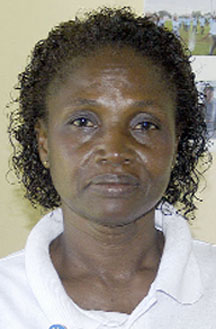By Iva Wharton
The lack of dedicated persons, finance and the absence of school or community programmes are the challenges responsible for the slow development of netball in Guyana, according to longstanding coach Lavern Fraser-Thomas.
The sport, Fraser-Thomas noted, was not a popular one to begin with, but it was still being played.
“When I started playing netball, we used to have inter-schools competitions in Georgetown, Linden, East Coast of Demerara and Berbice, as netball was one of the disciplines under the GTU [Guyana Teachers’ Union] inter-district sports,” she said.
However, following the removal of physical education from the schools curriculum, the sport suffered.
Fraser-Thomas said that while she was attached to the National Sports Commission (NSC) a school programme was started but was not sustained because of the lack of coaches.
“Even though I can safely say we have quite a few persons out there who would have learnt netball skills to some level, it did not impact on the schools programme, because of the inadequate number of persons to do the necessary guidance.”
However, the Guyana Netball Association (GNA), Fraser-Thomas said, is working on new programmes to address some of the challenges. Among the proposals is to have former players volunteer their time to train younger players with the hope of forming schools and community teams.
She said one of the difficulties with coordinating a schools programme is the lack of netball coaches at the National Sports Commission (NSC).
Fraser-Thomas now heads the sports department at the University Of Guyana.

In comparing Guyana’s players to their Caribbean counterparts, she observed that a lot has to do with the difference in club structures. In many instances, overseas clubs are engaged in the grooming of players from a young age.
“When a team is selected the players already know the basics of the sport,” she said, adding that “in Guyana’s case, when a team is selected, the coach in some instances is still tasked with teaching the basics of the sport.”
This, she said, takes away from real practice time.
She noted that in some countries, competitive netball starts from the under-11 category.
She also revealed that apart from those countries competing in the Caribbean championships they also compete in the Organisation of Eastern Caribbean States (OECS) championships, where they are members.
Fraser-Thomas said for the past five years, players competing overseas have had to pay their own airfare, while the association provides for uniforms, meals and accommodation. She said this speaks volumes.
With the limited sponsorship from government or private sector, members of the association or former players would fill the gap and sponsor championships. But those championships are not a lot.
She said a recent decision by the World Netball Federation is causing headache for countries like Guyana. That decision, she said, would see the best two Caribbean teams advancing to the world championship.
For most countries she said, there is nothing beyond the 16-year-and-under championship while for others like Jamaica, Barbados and Trinidad they will be looking forward to the qualifiers.
That issue, according to Fraser-Thomas, has to be addressed by the association and the country.
Fraser-Thomas said despite the many challenges she and others in the netball association are not giving up. According to her, the sport has done a lot of good for young women across the country.
“You feel good when you see what young women have achieved from where they started as a result of being involved in netball,” Fraser-Thomas said glowingly.
A player from the Eagles Netball Club did a stint at the New Opportunity Corps and now that young woman would be competing in the Barbados Workers Union competition next week, said Fraser-Thomas.





